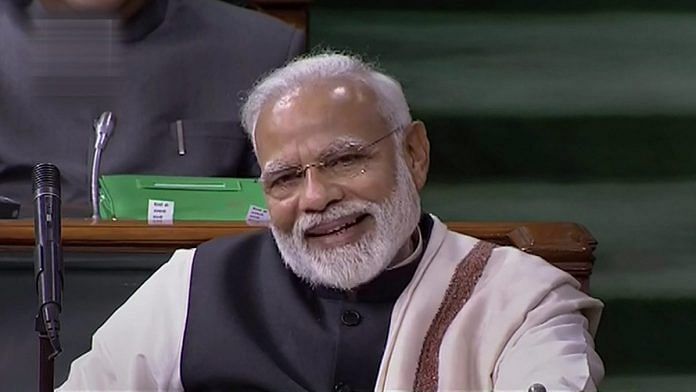For the head of the world’s biggest democracy to spend an entire term in the office without holding a single press conference should be a matter of concern. But Prime Minister Narendra Modi could do that between 2014 and 2019. The one place where he could be made to face questions from people’s elected representatives – inside Parliament – also rarely sees him responding to questions related to the ministries held by him. On most occasions, these questions are answered by the minister of state of the Prime Minister’s Office (PMO).
Can Indian Parliament then adopt a measure that Britain, the mother of the parliamentary system of democracy across the world, adopted in 1961?
Britain’s provision to make PM answerable
The “Prime Minister’s Question” was first introduced in the British Parliament on 24 October 1961. Under this provision, members of the House of Commons (the British equivalent to India’s Lok Sabha) ask questions directly from the prime minister every Wednesday. In the noon, one-and-a-half-hour period is reserved where only the prime minister answers questions on the government’s works on important issues.
Any member of the House initiates discussion on the government’s conduct of its business. After this, other members ask counter-questions based on the prime minister’s response. The PM is obligated to respond to their questions one by one. Although the PM does have prior information about the issues that might be raised during the discussion, s/he remains unaware of the exact question that would be asked. During this session, one member is allowed to ask only one question, but the Leader of Opposition can ask several questions.
Also read: Lack of opposition in Parliament doesn’t mean there won’t be any opposition to Modi govt
In Modi’s context
PM Modi often does not face questions on important issues. He is rarely seen answering questions during the Question Hour – either in the Lok Sabha or in the Rajya Sabha. While Modi delivers lengthy speeches in Parliament, he rarely indulges in cross-questioning. On most issues, only the concerned ministers respond to members’ queries. PM Modi does not even answer the questions related to the ministries held by him. This task is carried out by the minister of states related to the Prime Minister’s Office.
The founding fathers of the Indian Constitution chose the parliamentary system over the presidential system because the government formed under this method and its head – the PM – remain responsible towards the representatives elected by the people – the MPs. Under the Bharatiya Janata Party (BJP)’s rule, it has become quite evident that the head of the government, PM Modi, evades his responsibility of sharing details about the government’s plan with the Members of Parliament – and with that, the citizens of India.
India’s connection to British system
The British Parliament started the system of “Prime Minister’s Question” to avoid this kind of situation. As India has adopted its parliamentary system from Britain, it should also consider some of the important changes or innovations adopted by the British Parliament.
To understand the need to fix a special time for “Prime Minister’s Question” in Indian Parliament, we need to take a look at the history of the parliamentary system. In the modern world, Britain is referred to as the “birthplace of the parliamentary system”. This unique system – also termed as Westminster System – spread all across the world due to British colonialism. In the middle of the 20th Century, a large number of nations acquired independence from the British rule. Some of them opted for the United States’ presidential system of government, but India and several other countries adopted the parliamentary system.
Both the parliamentary and the presidential systems of governance have their pros and cons. The parliamentary system ensures representation of diverse groups of communities in governance and also makes the government answerable to the representatives elected by the public. On the other hand, while the presidential system ensures stability, it makes one individual – usually the President – too important.
On 10 December 1948, the Constituent Assembly of India witnessed a detailed discussion on whether to adopt the parliamentary or presidential system of governance. It was finally decided that since common people were already familiar with the parliamentary system, and because this system makes the government answerable to them, India should opt for the parliamentary model.
Also read: Modi government is making laws, not the lawmakers in Parliament
Changes in Indian Parliament
The biggest change in India’s parliamentary system took place in 1962 when the “Zero Hour” was introduced. “Zero Hour” is the time that immediately follows the “Question Hour”. Members first inform the Speaker and then ask questions from the government representatives on pertinent issues.
The second big change in the Indian parliamentary system came in 1993 when department-related standing committees were constituted for the first time. As of now, there are 24 such committees. Out of these, 16 function under the Lok Sabha Speaker’s supervision while the remaining eight are attached to the office of Rajya Sabha Chairman. These committees play an important role in the formation of laws related to their departments and also oversee their budgetary allocation etc.
The constitution of these committees has a profound impact on Indian Parliament’s style of functioning, which is why they are often referred to as ‘Mini Parliament’.
While India adopted the idea of standing committees from the US, the “Zero Hour” is its own innovation. In the same spirit, Indian Parliament can also make Britain’s “Prime Minister’s Question” a part of its system. It’s the need of the hour.
The author is a PhD student of Politics at Royal Holloway, University of London. Views are personal.
This article has been translated from Hindi. Read the original here.



